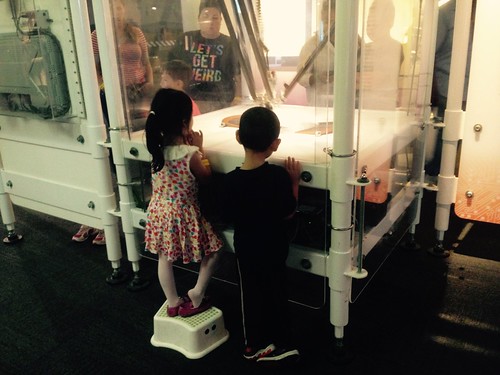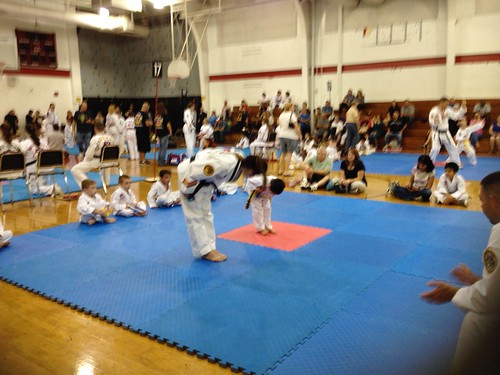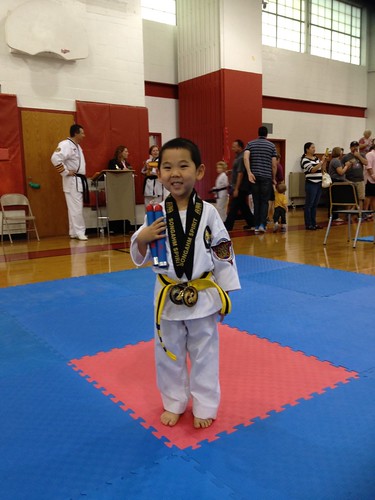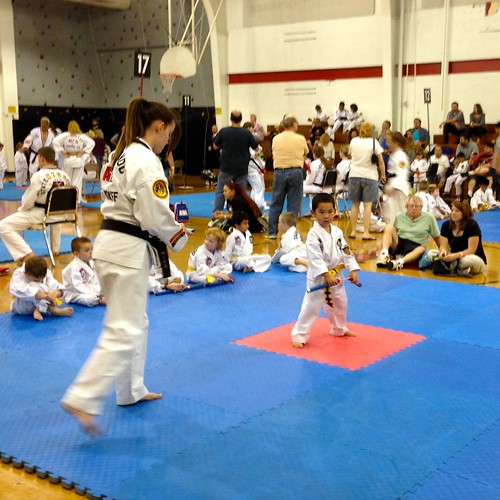 |
| Two Kindergarteners watching a robot. |
Some things are easy to establish because they are skills. Can the child count, read letters, read books, draw? But some things are harder to figure out by the parent, does the child show empathy, care for others, handle adversity, is the child eager to learn? These are harder to see because you cannot tell the difference between the child interacting with the parent and the child interacting with the outside world. In our case, we have to start off by admitting we think highly of our 4-yr old, seeing as we have accelerated him into an early start in Kindergarten. (specifically, a catholic full-day Kindergarten) But having the outside assessment is helpful.
Our Kindergarten teacher opened the parent orientation by telling us that they were going to be taking it slow the first two months so she could assess their levels. At that point, we knew we were in good shape because in two months in a fairly small environment (20 total Kindergarteners in two classes), we were pretty sure that T will have adjusted to give a proper accounting of himself. At one month, they are still looking for his reading level (we note that the library books that he brings from school are gradually increasing in difficulty), math is focused on sorting and shape (no challenge yet). His robotics teacher stating that he is doing well (essentially, at this point it means he can follow instructions to put together LEGO Technic and introduction to Scratch, both of which daddy school has covered.) His writing and drawing skills are noticably better (yeah!). He practices piano on his own (for some definition of practice), he has started playing with other kids, and his gym teacher states he is a joy to have in class. And more interesting, since we are not Catholic, is him talking about being 'provident' (attitude derived from the name of the order that sponsors the school).
He is still an introvert, and we do not expect that to change (after all, so are we). But we want him to develop the skills of interacting with the outside world. And the small class that he is provides him a safe place to do that. And we see it in how he carries himself around us, and in public. We like watching him try to take care of others, teaching other kids how to do things at museums, being polite to adults, he has even started holding doors open for people. And we note that one thing that being taught curtesy does, it provides a framework for approaching the world. A child showing curtesy is not at a loss in how to act and removing uncertainty makes everything more comfortable.
Another major milestone is T's first taekwondo tournament. T is in a American Taekwondo Association (ATA) class as a Tiny Tiger (4-6 yrs old). And our main concern was if he would completely freeze. I had even taught him the breathing technique for dealing with emergency that we teach in the Red Cross Pillowcase Project. But what got him started was the fact the he had to deal with the judges, and judges were just like instructors. And T knew how to treat instructors with respect and follow instructions.
What makes the tournament useful was not the prize (at this age, there are enough potential classifications of awards than there are participants, so everyone gets a prize, but some sound more 'real' than others), but the opportunity for him to be in an environment of strangers and perform. And for us to see how he is compared to the other 4-6 year olds. Just like every other environment he is in, he is clearly one of the smallest. But he is also self controlled. I found it amusing that as they were waiting (having 4-6 year old boys wait without anything to hold their attention is a loosing proposition). He would go between the standard figiting and moving to almost an exaggerated version of attention when he remembered where he was. We also saw him around kids from the various other area schools, and we realize that our school is just like all the others, and he gets compared in the same light. His memory (in the ATA, 4-6 yr olds are not expected to have memorized their poomsae, but he was clearly doing his with the leader instead of following as most of the kids did), focus (kicks and punches with snaps) and general lack of hesitation. Given that he was among the youngest of the bunch (the others were 5 1/2-6) he compares well. And doing well in his first tournament was a great confidence booster.
 |
| Bowing out after his form |
 |
| Medals for "Best power" in forms, one-steps, and weapons |

No comments:
Post a Comment